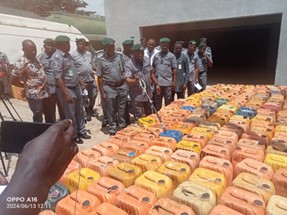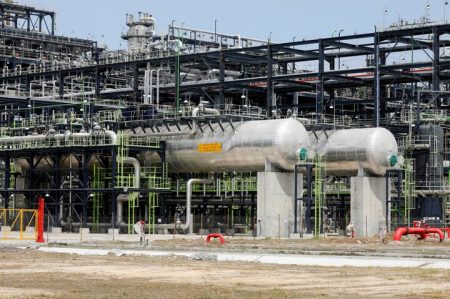
Oscarline Onwuemenyi
21 February 2018, Sweetcrude, Abuja – The Minister of State for Petroleum Resources, Dr. Emmanuel Ibe Kachikwu, yesterday, said the country must urgently address the issues surrounding pricing of petroleum products, stating that unless that is done, fixing the existing refineries and encouraging private investors to build new ones would not solve the country’s downstream problems.
Kachikwu, who was speaking at the ongoing Nigeria International Petroleum Summit (NIPS) in Abuja, supported the need for a regulation that will allow market forces to determine proper pricing of petroleum products in Nigeria, adding that the greater challenge the country would have and still have is that of pricing.
He stated that unless the issues confronting proper pricing of petroleum products, were urgently addressed, attracting investment to the sector may remain elusive.
Linking the current fuel scarcity in the country to price modulation, industry stakeholders had said the poor pricing regulatory framework put in place by government remained major factor confronting the sector and dragging back efforts on energy sufficiency in the country.
Indeed, the projection that the country would have private and public refineries running in the coming year may also face setback “because nobody is going to build a refinery and sell products at a loss,” Kachikwu said.
The President Muhammadu Buhari-led administration has insisted that it has no plans to increase the pump price of Premium Motor Spirit (PMS), also known as petrol, from its current rate of N145 per litre, despite the fact that the landing price of the product is about N171 per litre, a situation which has led to shortage of product and interminable fuel queues since November last year.
Kachikwu, however, stated that in any attempt to review the prices of petrol or any other commodity, care should be taken to ensure that people are not made to suffer unduly.
He said, “Ultimately, the greater challenge that this country would have and still have is that of pricing. Everybody wants power, available gas and freely delivered fuel with no queues, but people are not willing to make the sacrifices that are essential for these things to happen.
“Sometimes, it is a pricing issue. We have got to get to a point where we got to deal with some of these issues in a manner that doesn’t hurt our people but at the same time create the level of efficiency as to remove arbitrages and patronages that are inbuilt in them.”
According to the minister of state, “Refineries and local production are key. We expect a 12 to 18 months corridor of construction and hopefully, at that point, we would get our refineries back.
“However, if we get refineries back by 2019, does that solve the problem? No, it doesn’t. You still have to deal with the pricing issues, because nobody is going to build a refinery and sell products at a loss.”
Kachikwu further disclosed that the Federal Government would be setting parameters and incentives for building of refineries.
This, he insisted, is to ensure that a typical producer, especially the small level producers are able to see enough incentives to be able to get some of their products refined in-country, then exported.
“That is the major policy directive. There are going to be incentives for those who are doing the major practical investments in the refineries for example. There is not a dearth of opportunities in this country. I do not know of any country with the vast opportunities that Nigeria possesses,” he stated.
The minister argued that there was actually no reason why oil companies would do their business in Nigeria and take 100 per cent of the crude oil produced out of the country.
“What are they doing with it? They are going to take it to refineries; they are going to crack them somewhere. If there are incentives for them to crack them here, they would do so. Ultimately, Nigeria must aim to be the refining corridor for the whole of Africa. That is becoming very critical,” Kachikwu noted.
“If we do all that concerning the planned investments in refineries, my position is that the business has got to change. It has got to change to taking your crude oil and been able to refine. It has got to change to be a major player in the power sector. It is got to change from oil, into gas and into clean energy. We have got to look into moving incentives away from oil, back into gas and back into cleaner energy.”



